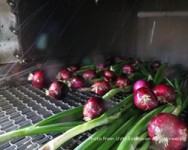CANCELLED: Farm Food Safety Meeting
Event Details
Date
December 5, 2022
Time
9:00 am - 4:00 pm
Location
CCE Wayne County
1581 Rt 88N
Newark, NY 14513
Cost
Registration per person : $15.00
(addl attendee $15.00 ea.)
Pre-registration required. Pay at the door.
Host
Cornell Vegetable Program, Lake Ontario Fruit Program, CCE Wayne Co.Robert Hadad
585-739-4065
email Robert Hadad

>>>>THIS EVENT IS CANCELLED DUE TO LOW REGISTRATION NUMBERS<<<<
This meeting will focus on updates and key considerations in farm food safety. Topics to be covered include agricultural water quality assessments, traceability procedures, tips for improving flow and efficiency in wash/pack facilities, cleaning and sanitation updates, plus plenty of discussion to answer your questions.
Agricultural Water Quality Assessment
Ag water includes surface water sources including ponds, creeks, streams, canals, lakes, water storage tanks, and wells. Do you know the quality of the water that comes from these sources? Contaminated agricultural water from these sources, used for irrigation, that come into contact with produce in the field can lead to human food-borne illness. This session will go over the basics of identifying, assessing, preventing, or dealing with potential problems. If your farm falls under Food Modernization Act regulations, the ag water assessments are expected to become requirement (by farm size) probably in 2023-24. Regardless of the regulations, any produce farm using surface water/wells would benefit from learning what factors influence ag water quality.
Tips for Improving Flow and Efficiency in Wash/Pack Facilities
Open discussion on improving flow and efficiency with harvest through the wash/pack activities and facility management. Tips on process as well as cleaning and sanitizing. Share your experiences and questions no matter what size farm operation.
Cleaning and Sanitation Updates
Industry information on sanitizers and choosing the right one for your farm operation.
Yes! Harvest Bins and Fruit Picking Bags CAN be Cleaned and Sanitized -- Faith Critzer, University of Georgia, and Laura Straw, Virginia Tech
Discussion on how to clean and sanitize hard to clean things.
Traceability Procedures
If you are following GAPs/HGAPs food safety programs, you are already familiar with traceability of produce -- one step forward, one step back. FDA will be releasing a new regulation that will require farms to be part of a universal traceability program to aid in the expediting of finding sources of outbreak problems. Note: The regulations will pertain to certain crops for farms where their buyers are required to be covered by the traceability regulation.
New York State has created a traceability program that can help growers and buyers be on the same page for produce being grown and sold in New York. Steve Schirmer, Produce Safety Field Administrator for NYS Department of Agriculture and Markets, will lead this discussion.
What are the Most Common Food Safety Issues Seen on Produce Farms? -- Kristina Sweet, Ag Development Chief, Vermont Agency of Agriculture
Information will be shared on barriers or other issues that some farms have faced in meeting food safety practices being implemented fully. The information presented here is equally as important for operations that don't fall under the FSMA regulations as the farms that must meet the regulations.
Q&A
There will be ample opportunity to ask questions of the presenters.
COST AND REGISTRATION
$15 per person; lunch is included. Pre-registration is required. Email Kimberly Cummings of CCE Wayne County or call 315-331-8415 to pre-register.
FOR MORE INFORMATION
Please contact Robert Hadad.
This event is sponsored by BioSafe sanitizer.

Upcoming Events
African Eggplant Participatory Breeding Kick-Off
March 5, 2026
Join us to learn about the Cornell African Eggplant Research Project and learn how you can participate! African eggplant, also known as Bitterball, Garden Egg, Kittley and other names, is an important crop for many members of our community with heritage from regions such as sub-Saharan Africa, Southeast Asia, and Brazil. Since 2024, the Cornell African Eggplant Research Project has been collaborating with growers and community partners across New York to develop high-quality varieties adapted to the Northeast U.S. In this meeting, we will share information about growing and preparing African eggplant, highlight our research to date, and invite partners to collaborate with us in our 2026 participatory breeding and variety selection efforts.
COST: FREE! You must pre-register to receive the Zoom link.
Managing the Invasive Swede Midge Webinar
March 6, 2026
Swede midge is an invasive fly that causes serious economic losses to brassica crops. Due to its small size and hidden feeding habits, swede midge is often called an "invisible pest" and damage may be misdiagnosed. In this webinar, we will review the swede midge life cycle and crop damage symptoms, current management recommendations, new research findings, and highlights from on-farm case studies with a focus on organic management.
1.75 DEC pesticide recertification credits in categories 1a, 10, and 23.
Good Agricultural Practices (GAPs) Food Safety Training
March 10, 2026
Newark, NY
Learn about food safety on the farm! This event hosted by the Cornell Vegetable Program, Cornell Lake Ontario Fruit Team, CCE Wayne County, and the NYS Department of Agriculture, will cover good agricultural practices (GAPs) to help reduce the risk of microbial contamination on the farm, keeping food and consumers safe.


































